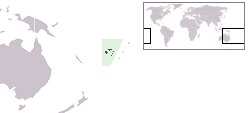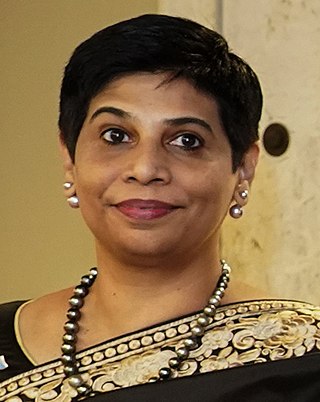Related Research Articles

The prime minister of Fiji is the head of government of the Republic of Fiji. The prime minister is appointed under the terms of the 2013 Constitution. The prime minister is the head of the Cabinet and appoints and dismisses ministers.

Josaia Voreqe "Frank" Bainimarama is a Fijian politician and former naval officer who served as the prime minister of Fiji from 2007 until 2022. A member of the FijiFirst party, which he founded in 2014, he began his career as an officer in the Fijian navy and commander of the Fijian military. Despite being suspended from Parliament, he served as the opposition leader from 24 December 2022 until 8 March 2023, when he resigned and was replaced by Inia Seruiratu.
Taniela (Daniel) Vafo'ou Fatiaki CF was the Chief Justice of Fiji from 1 August 2002, when he succeeded Sir Timoci Tuivaga, till 5 December 2008. As Chief Justice, he presided over both the High Court and the Supreme Court, but was constitutionally barred from presiding over, or even sitting on, the Appeal Court. On 3 January 2007, he was sent on leave by the Republic of Fiji Military Forces, which had seized power on 5 December 2006. On 19 January, he was formally suspended, pending an investigation into allegations of misconduct. This investigation was dropped in December 2008 as part of a deal that involved his formal resignation.
Since attaining independence from the United Kingdom on 10 October 1970, Fijian history has been marked by exponential economic growth up to 1987, followed by relative stagnation, caused to a large extent by political instability following two military coups in 1987 and a civilian putsch in 2000. This was followed by another military coup in 2006. Rivalry between indigenous Fijians and Indo-Fijians, rather than ideological differences, have been the most visible cleavage of Fijian politics. Later in 2020, Fiji was hit by the global COVID-19 pandemic, which affected the economy and the daily lives of the people.

General elections were held in Fiji between 6 and 13 May 2006.

The controversial Reconciliation, Tolerance, and Unity Bill promoted by the Fijian government throughout 2005 generated enormous debate, both locally and internationally. The legislation aimed to establish a Commission empowered to compensate victims and pardon perpetrators of the coup d'état that deposed the elected government of Prime Minister Mahendra Chaudhry in May 2000. Support for the legislation came from Japan, while New Zealand opposed it. Australia, too, expressed strong reservations about the legislation, but also called on opponents of it, including the Military of Fiji, to show greater moderation. Non-governmental organizations in a number of countries took positions, also.

The Reconciliation and Unity Commission was a proposed government body to be set up if the Reconciliation, Tolerance, and Unity Bill, which was introduced into the Fijian Parliament on 4 May 2005 was passed. The legislation proposed to empower the commission to grant amnesty to perpetrators of the Fiji coup of 2000, and compensation to victims of it from 19 May 2000 through 15 March 2001. The Fijian President would retain a veto over the granting of amnesty.

Lesbian, gay, bisexual, and transgender (LGBT) rights in Fiji have evolved rapidly over the years, however, LGBT people may still face legal challenges not experienced by non-LGBT residents. In 1997, Fiji became the second country in the world after South Africa to explicitly protect against discrimination based on sexual orientation in its Constitution. In 2009, the Constitution was abolished. The new Constitution, promulgated in September 2013, bans discrimination based on sexual orientation and gender identity or expression. However, same-sex marriage remains banned in Fiji and reports of societal discrimination and bullying are not uncommon.

The tension between Fiji's government and military forces, which had been simmering for more than two years, appeared to escalate in late December 2005. Tension between the government and the military had been simmering throughout the year, with Commodore Bainimarama and other military officers making strongly worded public statements opposing certain government policies, including the early release from prison of persons implicated in the Fiji coup of 2000, and the government's promotion of controversial legislation to establish a Commission with the power to grant amnesty to perpetrators of the coup.

The Fijian coup d'état of December 2006 was a coup d'état in Fiji carried out by Commodore Frank Bainimarama, Commander of the Republic of Fiji Military Forces (RFMF), against Prime Minister Laisenia Qarase and President Josefa Iloilo. It was the culmination of a political crisis that started the previous year, when the Qarase government introduced three bills to the Fijian Parliament. The Qoliqoli, Land Tribunal, and Reconciliation, Tolerance, and Unity Bills dealt with the ongoing ethnic conflicts in Fiji and the aftermath of the 2000 coup, and were considered to be pro-ethnic Fijian. Bainimarama presented the government with a list of demands on October 16 that included withdrawing the bills. Attempts at negotiation failed and the military launched the coup on 4 December. Parliament was dissolved, Qarase and his cabinet were dismissed, and some civilian officials were placed under house arrest. After the Great Council of Chiefs refused to appoint a cabinet friendly to the military, Bainimarama reached an understanding with Iloilo and reinstated him as President on 4 January 2007. Iloilo then appointed Bainimarama acting Prime Minister in charge of the Interim Cabinet.

Richard Naidu is an Indo-Fijian journalist, constitutional lawyer and opponent of the 2006 Fijian coup d'état. He is a former director of Transparency International Fiji.

Shaista Shameem, a Fijian lawyer, the director of the Fiji Human Rights Commission (FHRC) from 2002 to 2007, and its director and chairperson from 2007 to 2009. A graduate of the University of the South Pacific, she holds a PhD in sociology from the University of Waikato and a Masters in Law from the University of Auckland. She also holds a Doctorate in Juridical Science.

Nazhat Shameem Khan is a Fijian diplomat and former judge who served as the Permanent Representative of Fiji to the United Nations from 2014 to 2022. She was also the President of the United Nations Human Rights Council in 2021. She served as a judge of the High Court of Fiji from 1999 to 2009, the first woman to do so. She is currently a Deputy Prosecutor for the International Criminal Court.
Angenette (Angie) Heffernan is a Fijian human rights and democracy activist and executive director of the Pacific Centre for Public Integrity (PCPI). Prior to PCPI she was a prominent regional environmental political campaigner for Greenpeace Australia for eight years, during which she campaigned against Japanese plutonium shipments in the South Pacific. She established the Pacific Centre for Public Integrity with Suliana Siwatibau and social justice campaigner Aisake Casimira to combat perceived corruption and bad governance in the Pacific region, She is known for her strong stance against political and state corruption and for her outspoken opposition to the 2006 Fijian coup d'état.
In April 2009, Fiji underwent a constitutional crisis when the Court of Appeal ruled that the 2006 Fijian coup d'état had been illegal. The Court dismissed the Interim Cabinet led by Prime Minister Frank Bainimarama that had governed Fiji since the coup. However, President Josefa Iloilo announced on a nationwide radio broadcast that he was abrogating the Constitution. He dismissed all judges and constitutional appointees, and reinstated Bainimarama and his cabinet. He also instituted emergency rule which increased police powers and allowed media censorship.

RatuJosefa Iloilovatu Uluivuda, was a Fijian politician who served as the 3rd President of Fiji from 2000 until 2009, excluding a brief period from 5 December 2006 to 4 January 2007. He held the traditional title of Tui Vuda, the paramount chief of the Vuda district in Ba Province on Fiji's northwest coast. Like many Fijian people, he rarely used his surname and was known simply as Josefa Iloilo. He announced on 28 July 2009 that he would be leaving office on 30 July. At the age of 88, he was the world's oldest head of state.

Fiji is an island nation in Melanesia in the South Pacific Ocean with a population of approximately 849,000. It is made up of Fijians, Indo-Fijians, Europeans, Chinese, other Pacific islanders, and people of mixed racial descent. Fiji has been in a state of political unrest since their independence from Britain in 1970.
The Essential National Industries (Employment) Decree 2011 is a controversial decree issued by the military-led 'interim government' of the Republic of Fiji in September 2011. It was followed a few days later by the Essential National Industries and Designated Corporations Regulations 2011.
Fiji does not recognise same-sex marriage, civil unions or any other form of recognition for same-sex couples.

Republic of Fiji Islands v Prasad is a 2001 landmark decision of the Court of Appeal of Fiji which upheld the 1997 Constitution of Fiji in the aftermath of the 2000 Fijian coup d'état. The court agreed with the previous High Court of Fiji ruling that the constitution had not been overturned and that Parliament had not been dissolved, but only prorogued. It also found that the office of President of Fiji had only become vacant in December 2000 after Kamisese Mara resigned following the High Court ruling.
References
- ↑ Human Rights Commission Act 1999
- ↑ "Fiji Human Rights Commission suspended from international body". Radio New Zealand International . April 2, 2007. Retrieved September 30, 2011.
- ↑ Neilson, David (October 15, 2007). "David Neilson: What if Fiji ballot was less than 'free and fair'?". The New Zealand Herald . Retrieved September 30, 2011.
- ↑ "Arbour upsets Shameem" Archived 2012-02-23 at the Wayback Machine , Amelia Vunileba, Fiji Times, October 17, 2007
- ↑ No other way for the President Archived 2012-04-04 at the Wayback Machine , Fiji Times, April 11, 2009
- ↑ Fiji Police guard empty offices Archived 2012-03-06 at the Wayback Machine , Fiji Live, April 15, 2009
- 1 2 Republic of Fiji Islands Government Gazette [ permanent dead link ], vol. 10, no. 22, 22 May 2009.
- ↑ Sri Lanka Guardian, "Sri Lanka and Fiji: Ghost Human Rights Commissions", 20 September 2011.
